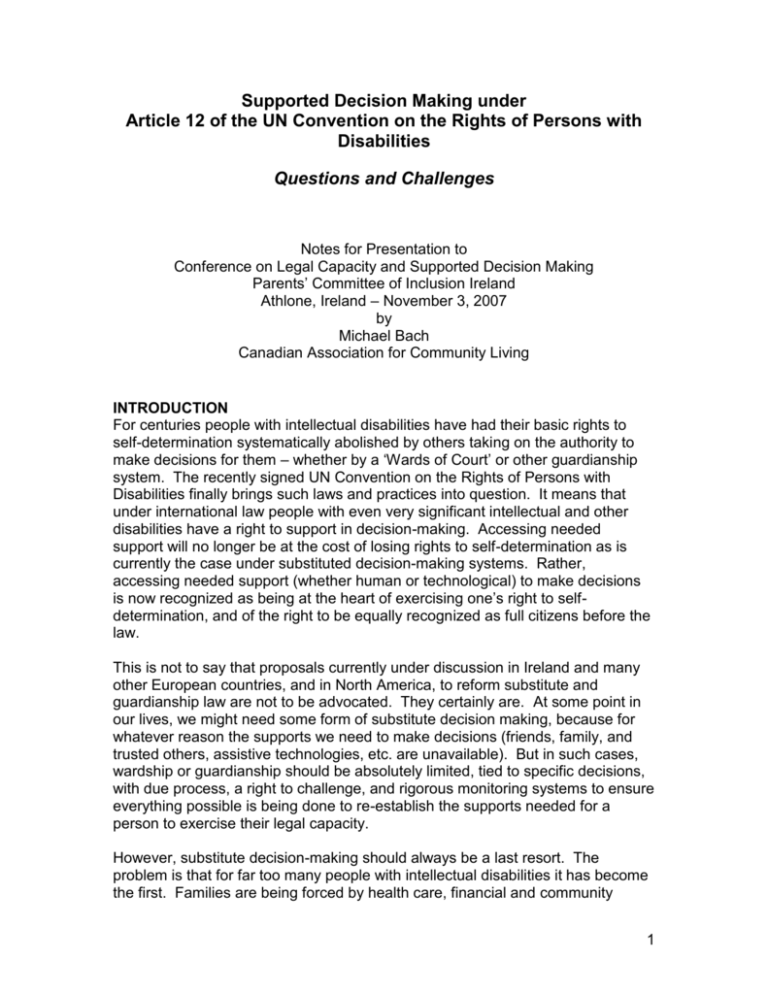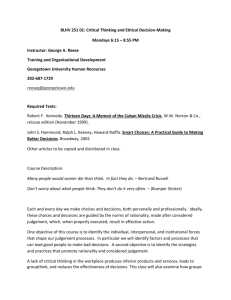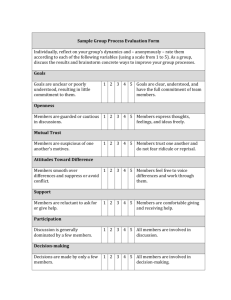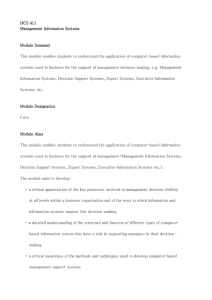Supported Decision Making
advertisement

Supported Decision Making under Article 12 of the UN Convention on the Rights of Persons with Disabilities Questions and Challenges Notes for Presentation to Conference on Legal Capacity and Supported Decision Making Parents’ Committee of Inclusion Ireland Athlone, Ireland – November 3, 2007 by Michael Bach Canadian Association for Community Living INTRODUCTION For centuries people with intellectual disabilities have had their basic rights to self-determination systematically abolished by others taking on the authority to make decisions for them – whether by a ‘Wards of Court’ or other guardianship system. The recently signed UN Convention on the Rights of Persons with Disabilities finally brings such laws and practices into question. It means that under international law people with even very significant intellectual and other disabilities have a right to support in decision-making. Accessing needed support will no longer be at the cost of losing rights to self-determination as is currently the case under substituted decision-making systems. Rather, accessing needed support (whether human or technological) to make decisions is now recognized as being at the heart of exercising one’s right to selfdetermination, and of the right to be equally recognized as full citizens before the law. This is not to say that proposals currently under discussion in Ireland and many other European countries, and in North America, to reform substitute and guardianship law are not to be advocated. They certainly are. At some point in our lives, we might need some form of substitute decision making, because for whatever reason the supports we need to make decisions (friends, family, and trusted others, assistive technologies, etc. are unavailable). But in such cases, wardship or guardianship should be absolutely limited, tied to specific decisions, with due process, a right to challenge, and rigorous monitoring systems to ensure everything possible is being done to re-establish the supports needed for a person to exercise their legal capacity. However, substitute decision-making should always be a last resort. The problem is that for far too many people with intellectual disabilities it has become the first. Families are being forced by health care, financial and community 1 service systems into placing their adult family members under wardship or guardianship simply because alternative supported decision making provisions and community services are not yet in place. Article 12 of the UN Convention calls on governments and civil society to rectify this situation. The cost to human liberty, it has finally been determined, is simply too high. However, Article 12 raises profound philosophical, conceptual, legal, policy and service delivery questions about obligations of State and society in securing the full legal capacity of people with disabilities. We have not yet tackled these questions in the comprehensive way Article 12 now requires. So in this paper/presentation I pose five questions and suggest some answers as one contribution to the discussion. A. What is supported decision-making and how is it distinct from other decision making processes and statuses in law, and what problems does it address? B. How should we define basic terms used or implied in Article 12 – ‘persons,’ ‘support,’ and ‘decision-making process’? C. What benchmarks we should be aiming for in designing and implementing supported decision-making on a national scale? What benchmarks for support networks, community services, policies/programs, and constitutional/legislative provisions? D. Given that States will undoubtedly claim limited resources to invest in supported decision-making, what do we believe are the priorities for investment? E. What does Article 12 suggest about recognition of substitute decision making and the elements, if any, of guardianship reform? I begin this paper by presenting Article 12, and then ask how we should define the basic concepts the Article uses or implies. Without some basic understanding and agreement about these definitions, it is difficult to think about what laws, policies, systems and safeguards should be built – because we won’t know what we are building them to do. In suggesting answers to these five questions, I raise a number of issues. The responses do read a little like a prescription. I present them this way to clarify the range of legal, policy and systemic issues Article 12 requires us to think through, and the directions I believe we need to pursue. But in now way do I recommend them as a final word. My suggestions are a way of consolidating and weaving together threads of various discussions and research I have participated in, and literature I have reviewed.1 1 In developing the ideas presented in this paper I have had the benefit of many sources 2 I want to note at the outset that the focus of this paper is on the place of support networks in a supported decision-making model. Article 12 should be read to imply a wide range of supports to assist people in exercising legal capacity – which could be anything from an assistive communication technology, to an interpreter, to a support network. The biggest challenge in implementing Article 12, I believe, is for people with disabilities who have very significant difficulties in being understood and recognized as a full person by third parties from whom they need an agreement to provide something (a flat, health care, a bank account, personal care, etc.) This is primarily the case for people with significant intellectual and/or psychosocial disabilities. Therefore, the focus of this paper is on the conceptual, philosophical, community, policy and legal foundations on which support networks would function as part of a supported decision-making framework. The aim is to enable people with even the most significant disabilities to be recognized as full persons before the law and exercise their legal capacity. ARTICLE 12: States Parties… 1. reaffirm that persons with disabilities have the right to recognition everywhere as persons before the law. 2. shall recognize that persons with disabilities enjoy legal capacity on an equal basis with others in all aspects of life. 3. shall take appropriate measures to provide access by persons with disabilities to the support they may require in exercising their legal capacity. 4. shall ensure that all measures that relate to the exercise of legal capacity provide for appropriate and effective safeguards which I don’t adequately reference here: literature in ethics, philosophy and law of personhood; case law on the questions; position papers developed by Inclusion International and member associations and other ‘think tanks’; and very importantly the insights of many I have had the opportunity to discuss these ideas with. Most recently these include Diane Richler and Connie Laurin-Bowie at Inclusion International (not for the first time of course); Sandor Gurbai at our sist er organization in Hungary, EFOESZ; and Oliver Lewis, Gabor Gombos, and Jan Fiala at the Mental Disability Advocacy Centre (MDAC) in Budapest. I have also learned much from presentations and discussions with participants at the conference on legal capacity and supported decision making convened by EFOESZ in Budapest in October 2007; similarly from those at the conference on legal capacity and supported decision making convened by Inclusion Europe in Warsaw in May 2007; from discussions with and presentations by members of the International Disability Caucus at the Ad Hoc meetings for the CRPD; of course from many colleagues and friends with the Canadian Association for Community Living since we started work on supported decision making in the early 1990s; and from research I have done in Canada. In acknowledging them here, I do not suggest that all of these people necessarily agree with the preliminary conclusions I have reached here, though the conversations have been rich and clarifying for me. 3 5. shall take all appropriate and effective measures to ensure the equal right of persons with disabilities [to inherit and control property, direct financial affairs and gain access to credit]. A. What is supported decision-making and how is it distinct from other decision-making process and statuses in law, and what problems does it address? Supported decision-making represents an emergent legal status that will be of benefit, in particular, to people with significant or ‘profound’ intellectual, psychosocial, and communicational disabilities. The essence of supported decision-making is to enable people to maintain full legal capacity (both recognition of rights and capacity to exercise those rights) while availing themselves of legally recognized access to supports. Forms of Decision Making Status Four basic forms of decision-making status currently predominate in law, policy and as practiced by health care and financial institutions, and in the realm of personal care. These are: Autonomous decision-making – A physician or banker recognizes a person or another party to an agreement or contract an individual wants to enter, as someone who is capable of understanding the nature and consequences of the agreements they enter. Other parties to the contract (physician, etc.) can then be confident that in entering the agreement for a health care intervention, or other service (e.g. bank loan) their liabilities are protected. There is a recognition that in decision making process to manage informed consent and entering contracts with those with disabilities, physicians and others have a duty to accommodate individuals to exercise their autonomous decision making status. Thus Reach’s A Handbook on Disability for Law Professionals identifies various aspects of this accommodation process to ensure a legal consent, including drawing on the input of family members if a person is dependent upon them. Nonetheless, these accommodations operate very clearly within an understanding of personhood where a person must demonstrate, even with accommodations and assistance, that they fully understand the nature and consequences of the decision in question. For many people with intellectual and psychosocial disabilities these criteria, even with the accommodations as conceptualized in case law and articulated by REACH, ARCH and others, are impossible to reach sufficiently in the eyes of physicians and others to maintain their autonomous status in decision making. Substituted decision making – When people are perceived unable to meet the criteria required for autonomous decision making (many would argue that no person is able to meet the ideal it requires in terms of intellectual rationality), 4 even with accommodations, they are usually placed under some form of substitute decision making status. This status has a history that is over 6 centuries old in the Anglo Saxon legal tradition. As legal capacity to manage property rights and contracts became more and more elemental to social and economic functioning in England in the 14th century, a substituted decision making status was created under the parens patriae jurisdiction of the Crown – essentially a jurisdiction the Crown assumed for itself, to take responsibility for those unable to care for themselves, and with no other means of support, and who did not meet the criteria for exercising autonomous decision making. In these instances, an individual’s legal person and property were transferred to the Crown for safekeeping and management. This jurisdiction was imported into the Canadian legal system and is the foundation in common law, and there are similar foundations in the civil code tradition that operates in Quebec, for our contemporary substitute/guardianship decision making provisions under which many people with intellectual and psychosocial disabilities, and increasingly seniors, fall. This status has been considered for many years the only way that physicians, financial institutions, etc. can manage agreements with respect to an individual’s health care, financial, or other personal needs when they are perceived as unable to manage autonomous decision making. If one party (the physician) is not convinced that the individual can manage autonomous decision-making, they are legally required to have the decision made by substitute decision-making means. Not to do so, would expose the physician or other parties in a similar position to liabilities, and to agreements being declared null and void. Substituted decision making is authorized in a variety ways depending on the jurisdiction – some provide only for full or plenary guardianship (all decisions to be made by others); some provide both plenary and partial (only certain types of decisions fall under substituted judgment; for others a person retains autonomous status). In some jurisdictions, a range of authorities is prescribed as possible substitute decision makers – from a public guardian to a private guardian; while in other jurisdictions only a public guardian system is authorized. Within Canada and internationally over the past few decades, there has been a growing recognition that the paternalism of substitute decision making arrangements need to be much better balanced with liberty and selfdetermination rights of people who fall under substituted judgment. Powers of Attorney and Advance Directives – A third status is when a person with recognized autonomous decision making power designates another to make decisions on his or her behalf at a point in the future when they might no longer be considered competent/capable/autonomous enough to enter agreements with others for things/services they require. Many see this designated power of attorney, or living will, or advance directive, as a solution to managing personal 5 decision making in the future as they anticipate their senior years when their intellectual functioning may decline. These legal mechanisms essentially place a person under substituted decision-making – but only at a point that a person him/herself identifies before hand (the ‘triggering’ event) and with guidelines specified by the individual in the enduring power of attorney or the terms of the advance directive or living will. A person thereby consents to place themselves under substitute decision-making but within parameters clearly established by the person. Thus, this status is quite different to #2 above, where persons with intellectual and psychosocial disabilities are place under a substitute authority, exclusively on grounds determined by others. Legal ‘Friend’ or ‘Mentor’ In national jurisdictions in Germany, Austria, Sweden, Finland and a few other European countries, legal ‘friends’ or ‘mentors’ have been provided for by the Courts as a way of managing what can be a sometimes ‘grey zone’ between autonomous and substitute decision making. If a person’s legal capacity to exercise his or her rights is questioned by the Courts, a capacity assessment is undertaken, and if found legally incapable in some or all respects a ‘mentor’ or ‘friend’ can be appointed. These countries have extensive guardianship systems managed in this fashion, with large delivery systems for managing legal mentor/friends. The legal mentor/friend is given the authority to make substitute decisions in some or all areas, but can exercise this authority with discretion. They are to practice their role by drawing on the wishes of the person in question, and may leave room for the person to exercise autonomous decision making with respect to certain personal, health care, or financial, but may decide at other times, to make substitute decisions if they feel the person is unable. Limitations with Current Options A number of limitations have been identified with the current regime of decisionmaking options: o Many people with more significant intellectual and/or psychosocial disabilities are unable to meet the criteria, even with accommodations, to maintain the liberty and self-determination rights autonomous decision making status enables people to exercise. o Substitute decision making provisions have led to denial of basic rights to many, are highly paternalistic, often imposed without due process, are not sufficiently monitored, and provide few if any means for people to retain autonomous status. o While Powers of Attorney and Advance Directives are a solution that enable people to consent to parameters of substitute decisionmaking they themselves largely establish, this is not available to people with significant intellectual and psychosocial disabilities, because they are often not considered legally competent to designate these authorities. 6 o These options do not sufficiently recognize emergent case law that has established a ‘right to decide’ for those who can only express their will and intent; or those who have around them a network of people who can bring narrative coherence to a person with significant intellectual disabilities, sufficient to establish the direction that personal decisions should take. o The legal mentor/friend leaves the discretion entirely up to the provider to determine when a person maintains an autonomous decision making status, and when they will impose substitute decision-making. Such a high degree of personal discretion seems inconsistent with the priority and protection given to liberty and selfdetermination rights in modern rights-based democracies. o These options do not provide a ‘second to last resort’ to substitute decision-making. There is unquestionably a need for substitute decision making provisions so that personal, financial and health care decisions can get made legally, when other parties feel that informed consent cannot be provided through autonomous (even with accommodations) decision making. Guardianship/substitute decision-making is increasingly identified as a ‘last resort’ given the risks it presents to liberty rights, and to the social perceptions of people with disabilities that come under guardianship and are no longer recognized as full persons. However, no second to last resort, short of accommodations that are insufficient for people with more significant disabilities, has been clearly established in law. Supported Decision Making – an alternative decision making status To address concerns and limitations with the options briefly outlined above, a fifth legal decision making status has been articulated over the past number of years in Canada. In this status, an individual’s full legal capacity is fully recognized if they can demonstrate to others their will and intent, and if not, if their ‘personhood’ can be articulated by others designated as sufficiently knowledgeable to understand a person’s unique communication forms and life history. Competency is attached to the decision making process, and not to the person, thus circumventing some of the issues associated with ‘autonomous’ decision making, where it is the person’s intellectual and communicational abilities which are assessed as capable or not. A personal network of people is designated as the trusted authorities to assist a person in making decisions (which assistance can include interpretation of a person’s will, the telling of a person’s narrative and why certain decisions make sense, etc.) The rest of this paper explores some of the basic concepts in Article 12 and how these relate to a supported decision-making process. 7 B. How should we define some of the basic terms used or implied in Article 12 – ‘persons,’ ‘support,’ and ‘decision-making process’? To develop a clear position and understanding on what Article 12 requires we need to define some of its basic terms: 1. the persons for whom States shall recognize legal capacity equally; 2. the support to which States shall ensure access. In other words, what do we mean by the term “support” in the supported decision-making model we seek to advance; 3. the decision-making process in a supported decision making model through which legal capacity will be recognized as being legally exercised. 1. Persons Conventional ethics and philosophy of ‘personhood’ suggests that full legal persons are only those who can: o make autonomous decisions (or make decisions by themselves), which means they… o understand the nature and consequences of their acts o act voluntarily without the assistance of others o communicate in ways fully understood by others with whom they enter agreements to exercise their legal capacity. This notion of personhood has roots that go back at least a few thousand years. It has served to diminish, and in many cases abolish, the moral and legal status of persons with intellectual disabilities who are considered unable to ‘measure up’ to these criteria. However, a richer and more interdependent account of personhood can be written, one more inclusive of people with intellectual disabilities. We can write this account by drawing on our own experience as people with intellectual disabilities, families and advocates, more recent literature in ethics and philosophy, as well as some case law. Three main criteria can be drawn from our experience and this literature to define persons whose right to exercise legal capacity should be equally recognized before the law. They are individuals of legal age: o who can make decisions, with or without the assistance of others; and/or o who can make their will and intent known to others; and/or o whose narrative coherence (in the terms of moral philosophy) can be presented; or whose personal identity and life story (past, present, and hopes for the future) can be narrated or told in a way that makes sense to others. 2. Support This definition of personhood suggests three types of support should be made available to assist persons in exercising their legal capacity to act: a. Assistance in decision making o Communication (including assistive technologies) o Interpretation 8 o Translation b. Assistance in expressing to others a person’s will and intent – about what it is they want to do, or refuse. c. Assistance in communicating to others someone’s personal identity – a person’s hopes, expectations, life plan The definition suggests a range of supports might be identified as part of a supported decision-making model: o Communication technologies o Information assistance o Translators o Support networks of committed individuals to assist a person in making decisions, interpreting and communicating their will and intent for others, and presenting a person’s narrative identity, or life story to others in order that the person can be recognized as a full person by third parties. This definition suggests that a principle of proportionality must always apply in supported decision-making – supports provided according to need. This definition of support also suggests some criteria for recognizing those best able to provide support in a supported decision-making network. Support network members’ primary function is to assist those whose legal capacity to act is questioned because they cannot be understood by others. Support network members are people who: o are designated by the person to play this role and/or are trusted by the person to assist and represent him/her o know the person well o have a personal relationship of commitment to support the individual o at least to some extent, are members of the person’s geographic community, as they play an essential role in helping a person to exercise their legal capacity in their community o are able to interpret and help express a person’s will o are able to understand and translate a person’s unique ways of communicating o have acquired enough information to present in a coherent way the story of a person’s strengths, contributions, needs and desires, their past and present situations, and future intentions. This understanding suggests that supported decision making via a support network takes place in the context of a trusting, committed, and close set of personal relationships. Relationships among individuals and support networks must have a very human quality, which needs to be continually nurtured. It is not a ‘social service’, which can be delivered by a bureaucracy. As such, these relationships can also break down, as all personal human relationships can. When this happens, people can lose the social foundations essential for exercising their legal capacity. 9 3. Decision-making process People make at least four basic kinds of decisions in exercising their legal capacity: personal (living, relationships, personal care), financial, health care, and civil/political (e.g. voting). The traditional definition of personhood suggests that the decision making process to exercise legal capacity takes place entirely in a person’s own mind. If we challenge that idea, what kind of decision-making process do we imagine States parties should aim to establish, and compel others to respect, in order to meet their obligations under Article 12? A kind of decision-making process… o Where support of others in making decisions is recognized as legitimate; o Where the process is seen as competent or incompetent, not the person; i.e. where the individual’s decision, intention, and/or narrative/life story are clearly understood by all parties; and the process for arriving at that understanding and the decisions that follow from it, have not been compromised through false information, conflicts of interest, coercion, denial of a person’s voice or wishes; o Where expression/translation/interpretation of a person’s will or intent to do, or not do something, can be recognized as a foundational decision. It is foundational in that it is recognized as sufficient to protect that person’s full legal capacity to act even if she or he needs others to make decisions to realize or give effect to the expressed intent; o Where a person, who is unable on his or her own to communicate and be understood by third parties, is nonetheless presented to these parties as a full person deserving of equal recognition before the law. This is done by presenting the person’ past, present, and intentions for the future by others (a support network) telling that person’s life story or narrative. This story need not be told by the person her or himself whose legal capacity to act is questioned by others, nor do all the events within it need to be remembered by the individual. It needs to be told by those who are in the position to tell the story; those recognized as the legitimate storytellers of a person’s life; o Where the process can always be challenged for not being a ‘competent’ one; o Where the outcomes (i.e. decisions arrived at) are not challengeable if the decision making process is considered a competent one. C. What benchmarks we should be aiming for in designing and implementing supported decision-making on a national scale? What 10 benchmarks for support networks, community services, policies/programs, and constitutional/legislative provisions? In this section I focus on developing benchmarks for a system that would enable support networks to function as part of supported decision-making. As defined above, some needed supports may simply be assistive communication technologies, an intervenor or interpreter. It is when these supports are not considered enough for a person to exercise legal capacity, that we are proposing that people must have a right of access to support networks as part of a supported decision-making process to enable exercise of legal capacity. Our biggest challenge as we seek to advance Article 12 is conceptualizing these networks; their function; and their community, policy and legal foundations. It is access to support networks that will enable people with intellectual disabilities who have the most significant difficulties in communicating and being understood by third parties to have a chance at exercising legal capacity. 1. Support networks Support networks are the social foundation of supported decision-making. This discussion suggests that support networks: are made up of a small group of individuals who are in personal relationship to a person who needs supported decision making to exercise legal capacity, and who have personal knowledge about the person are a group of people who commit, on a voluntary basis, to assisting a person to make decisions, and have their decisions respected. include people who may bring a diversity of relationships, connections to the community, skills and views to the network – family, friends, other community members are a group who may sometimes need assistance to manage decisionmaking, and differences of opinion will always make available at least some of its members to assist a person to in making needed decisions and entering agreements with others are not liable for agreements a person enters into with the assistance of supported decision-making, unless those network members have failed to provide adequate support, or have been in a conflict of interest in some way in the decision-making process. 2. Community Service System for Supported Decision-Making Support networks are necessarily part of the community in which a person lives. At least two main things are needed at the community level for developing, supporting and recognizing these networks of relationships: A Community Resource – Communities need capacity to assist people to develop and exercise supported decision-making. Experience to date suggests that the best way to deliver this capacity is via a communitybased agency or group mandated to: 11 o provide access to needed communication technologies, interpreters or others who can assist an individual in exercising legal capacity. o where support networks are required to exercise legal capacity, assist people to develop, nurture, and sometimes rebuild networks of personal relationships, based on the criteria above This assistance might be provided informally in the community depending on the context; Where resources and infrastructure are available, it could be provided by a community agency, through a paid facilitator to assist in developing support networks; o provide individuals in need of support, support network members, and third parties involved in decision making with a place to go for information about supported decision-making, and assistance in managing decision-making, mediating conflicts, etc.; o raise awareness about supported decision making among the general community, and financial, health care and other institutions o identify, recruit and support volunteers who commit to entering a personal relationship with a person who needs a support network to exercise legal capacity. Support Network Registration System – For supported decision-making to function and be considered legitimate in financial, health care and other institutions, these third parties must be satisfied that support network members are appropriately mandated to play this role. Therefore, there needs to be some system in the community for individuals to designate support network members o Can this be done at a community resource centre mandated to enable supported decision-making? o Do support network members get an identity card? o Can the system be online, so third parties can easily access the information? o In communities without this kind of infrastructure, are there more traditional or culturally sanctioned ways to grant this recognition to support networks and supported decision-making? 3. Policies and Programs Discussion above suggests a range of policies and programs would be needed to enable support networks to develop and function in a supported decision making context, and for communities to develop needed capacities: Mandated State authority with responsibility to develop and guide delivery Policy framework to guide delivery of supported decision making community resources and registration system Designated community resource agencies or authorities (How many? Where? Who delivers? Roles? Responsibilities?) Funding and monitoring community resource agencies 12 Registration system – rules, guidelines, delivery, etc. Guidelines for core information resources on what supported decisionmaking is, how it is managed, etc. Promotion of supported decision-making among government authorities, professional associations, major financial, health and other institutions at the national level. Again, in countries and communities without such infrastructure, more informal, volunteer, and customary ways of enabling and recognizing relationships would be needed. 4. Constitutional/Legislative Benchmarks The above discussion suggests five main elements of law reform are needed to build the legal foundations to protect rights of all parties in a supported decision-making context; and on which support networks, community capacity, and needed policies can develop and function: Civil Codes, Human Rights Codes, Constitutional Law Supported Decision-Making Legislation Adult Protection Legislation Substitute Decision Making Legislation A Court/Tribunal of Rights Protection Civil Codes, Human Rights Codes, Constitutional Law to: o Provide a clear right of self-determination by all persons without discrimination on the basis of disability; o Provide a clear statement of equal recognition before the law for all persons without discrimination on the basis of disability; o Ensure that legal capacity to act is not in anyway diminished solely on the basis of disability; Supported Decision-Making legislation that: o Enables persons to designate supporters (on the basis of trust witnessed by others); o Defines the ways in which legal capacity can be exercised; o Recognizes legitimacy of support networks, and means by which this recognition can be registered so it can be respected by others; o Provides for State investment for assisting: people to develop and register support networks for the purposes of recognition by others; third parties and support networks to manage supported decision making; and communities to provide information and resources on legal capacity and supported decision making; o Outlines duties and obligations of supporters; o Requires third parties (doctors, financial institutions, etc.) to recognize supported decision making; o Provides guidelines for obtaining informed consent and entering contractual agreements via a supported decision-making process 13 o Provides means for individuals to challenge the decision making process in any particular case. o Establishes a State authority mandated to develop and guide implementation of a supported decision-making system o Establishes a ‘Legal Capacity’ Monitoring/Accountability function to report to Parliament on effectiveness of steps taken to protect and enhance legal capacity to act Adult Protection Legislation that: o Enables intervention where a person is at risk of harm/abuse by supporters or others; o Enables temporary or permanent removal of supporters and alternate decision making if needed; Substitute Decision Making Legislation that: o Provides a means for substituted decisions to be made when persons who require supported decision making do not have the persons in their lives who can provide the assistance, according to criteria outlined above; o Establishes all the safeguards – all substitute decision-making is time-limited, subject to necessary review, only partial (no plenary/full ever permitted, fair process), etc.; o Imposes accountability on the State to invest in developing the needed foundations for supported decision-making in a person’s life and in their community so that substitute decision-making can be lifted as soon as possible. A Court/Tribunal of Rights Protection to hear challenges and make determinations about: o Whether, in fact, a person requires supported decision making to maintain full legal capacity to act; o Who should be legally recognized and registered as support network members, if there is disagreement about who a person has designated by an expression of trust or other means; o Whether a supported decision is the result of a competent decisionmaking process; o Whether a person is in fact at sufficient risk to have Adult Protection agencies actually remove a person from their support network or others, and restrict legal capacity; o Whether the State has fulfilled its responsibility to assist a person develop supported decision making; o Whether adequate safeguards to minimize restrictions of legal capacity under substitute decision-making have been met. 14 D. Given that States will undoubtedly claim limited resources to invest in supported decision-making, what do we believe are the priorities for investment? There are likely millions of people with intellectual disabilities across the globe who are either under guardianship, living in institutions, isolated in the community, or in abusive and exploitative relationships with others. The vision of supported decision-making our members hold will take significant resources and time to establish and deliver. This fact raises a number of questions about what we advocate for, what we ask governments to do with respect to Article 12: Which groups of individuals, in what settings do we focus investments for supported decision-making? Should we start with those now under formal guardianship, so that they can move out of substituted decision-making as soon as possible? Should we start with those living in communities where there is already some infrastructure of community resources/agencies to deliver needed assistance? What about people living in institutions? Given that they are basically confined and most do not have the right to decide to leave, do we wait until there are plans for moving an individual to the community, and begin developing a support network at that point, if needed? Of course strategy will vary by country, so what kinds of tools should Inclusion International focus on creating to assist members in their advocacy efforts and negotiations with governments to get the process going? E. What should our (Inclusion International and member associations) position be about recognition of substitute decision making in Article 12, and the elements, if any, of guardianship reform in light of Article 12? The discussion above suggests there is a limited and restricted place for substitute decision-making provisions in an overall system to promote and protect legal capacity. It suggests that we should conceive supported decision-making to be based fundamentally on personal relationships of commitment, trust, personal knowledge, and deep understanding of another person. For many people such relationships do not exist. They must be developed. For those who have such relationships, we know that it is in the nature of human relationships that they can break down, sometimes temporarily, sometimes permanently. And if such human relationships are the only means a person has to communicate with others (a doctor, a personal care provider, a banker), whom a person needs to agree to provide something (e.g. health care), then when these relationships break down supported decision-making is not possible at least for that decision. This means that for some people, at some times, we will need a system of substitute decision-making, so that decisions that need to be made can get made. 15 We cannot force doctors, bankers or personal care providers to do something to or provide something to a person, if they cannot satisfy themselves that the person is entering the agreement either completely autonomously or through a supported, or legitimately authorized substituted decision-making process. If they cannot satisfy themselves of this, and still do something to a person (e.g. medical interventions outside of emergencies), they are exposing themselves to various liabilities. And, I don’t think we want to advocate for law reform to diminish the duty of these third parties to enter agreements and contracts on any basis other than informed consent expressed autonomously or via authorized supported or substitute decision-making. I believe we need to accept the fact that States cannot responsibly give up some means for legitimately authorized substitute decision- making. They require this authority if they are to protect the foundations of contract law and informed consent (and thereby the rights all parties to agreements), and at the same time ensure that the most vulnerable people (those without a network of trusted personal relationships and unable to be understood by others), are able to get their basic needs met by others. If we don’t advocate for effective safeguards in substitute decision-making, and spell them out very clearly, we will leave some people with intellectual disabilities vulnerable to unconscionable regimes of guardianship. Because, again, recourse to legitimately authorized substitute decisionmaking is an integral feature of the relationship between states, individuals, markets and civil society in our modern/post-modern era. I would suggest the following kind of reading of Article 12: o Article 12 aspires to meeting people’s needs for decision-making assistance and human relationships in a way that they will not have to be subjected to substitute decision-making. o Recognizing this, States Parties, civil society and other actors must make every effort to invest in community resources and capacity to develop needed relationships and respectful recognition of supported decision-making. o Nonetheless, we must plan for the fact that human relationships sometimes break down, and that it will take time to develop supportive relationships for those who do not now have them in their lives. o Therefore, we also recognize that no person or State can responsibly guarantee that all persons will always have access to supported decision making at all times in their lives. o Given this, we recognize that legitimately authorized substitute decision-making is sometimes going to be necessary. If we follow this line of thinking, we could recommend that paragraph 4 of Article 12, “ensure that all measures that relate to the exercise of legal capacity provide for appropriate and effective safeguards,” be understood to mean something like: 16 o Full or plenary guardianship is a total violation of people’s right to legal capacity and can never be effectively safeguarded, so it cannot not be allowed under Article 12 (as already advocated by some of II’s members like our Hungarian sister organization ÉFOÉSZ); and o Substitute decision-making authority can only be granted for specific decisions, and when it is, effective safeguards (fair process, time-limits, monitoring, etc.) must be in place (as outlined by MDAC and others). o Whenever substitute decision-making is authorized, strict obligations must be imposed on the State to help establish or reestablish the foundations of supportive relationships in a person’s life so that supported decision-making can replace substitute decision-making as soon as possible. o Supported decision-making must also be subject to effective safeguards to protect a person’s legal capacity and human rights. Conclusion Supported decision making represents a new alternative in the range of legally authorized decision making statuses. Much of the work from a disability law perspective has been focused on how to accommodate the existing highly recognized and protected autonomous decision making status for people with disabilities. However, accommodations within this model reach a limit point for people with significant intellectual and psychosocial and communicational disabilities. Supported decision making seeks to expand the range of options between autonomous decision making status and substituted decision-making status, authorized either through guardianship measures or designated Powers of Attorney and advance directives. Thus, it represents an important contribution to enabling access to the right to exercise legal capacity by people with significant disabilities. The questions and benchmarks outlined above raise significant legal, policy, service delivery and practice implications. It is clear that substantial infrastructure is needed to in order to fully implement a supported decision making system. Suggested benchmarks are offered here not as an absolute prescription. Rather, they are meant to encourage a fulsome discussion about the range of legislative, policy and practice steps that must be taken by legislators, governments, and civil society to enable persons with disabilities to access full legal capacity. 17






